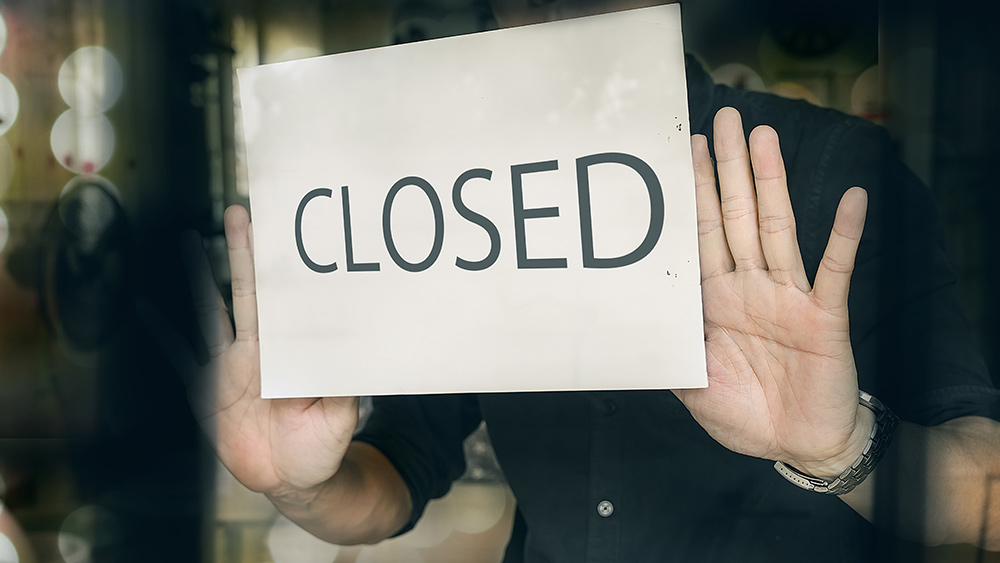
Advertisement
Without a doubt the Communist Chinese government has lied to the world about Wuhan coronavirus (COVID-19), and especially its severity.
But the government there has also covered up the impact the pandemic has had on the country and the Chinese people themselves thanks to the authoritarian policies the regime put in place to try and control the virus’ spread.
Thanks to the intrepid reporting of The Epoch Times, which has impeccable sources inside China, where the government tightly controls information, we are beginning to get a better picture of the pandemic’s aftermath. (Related: New brain-damaging disease “Stupid-19” makes people think the coronavirus is a HOAX.)
It is grim, especially for Chinese business owners — and is a warning to Americans about what’s coming the longer we keep our country shut down over the virus.
Nearly half a million businesses in China closed down in the first quarter of 2020, according to data collected by online databases, revealing the extent of the epidemic’s impact on the country’s economy.
Meanwhile, business owners began protesting for government financial support as their businesses are on the brink of bankruptcy.
After Chinese authorities recognized the severity of the outbreak, they began implementing strict rules to try to reduce infections — measures that included mandatory business closures. (Sound familiar?)
In much of China, in fact, business activities were halted. Places like Wuhan city, the pandemic’s epicenter, remain under quarantine, in fact. Other cities and regions, like Jia county in the Henan province, briefly lifted isolation restrictions but another outbreak led the government to re-impose them and keep businesses shuttered.
“We want [the landlords] to reduce the rent by half, and [the government] to cut the management and utilities fees by half,” said Cheng Dong, a garment factory owner in Zhuzhou city, Hunan province, The Epoch Times reported.
Many will never reopen
“I have no orders coming in. The wholesalers told me that people are not buying clothes right now [due to lockdown measures],” Cheng told the Chinese-language Epoch Times in a phone interview on April 3.
Meanwhile, Chinese workers are staying home and not going to work over fear they will contract the disease. Cheng said just 12 of 35 workers at his factory have showed up in recent days.
He said he joined about 8,000 local business owners who protested the municipal government March 31.
“We marched 3 kilometers [about 1.86 miles] from the wholesale market to the municipal government. We occupied all the roads [due to the large crowd]. The police then arrested more than ten female business owners on site… trying to scare and disperse us,” Cheng said. “On the second day [April 1], many business owners continued to protest.”
The Epoch Times noted further that in recent weeks, similar protests have spread throughout the country.
Interestingly, state-controlled Chinese media reported the appalling number of businesses forced to close due to quarantine orders imposed by the government.
The China Securities Journal reported April 2 that Tianyancha, a database, recorded 460,000 permanent closures of companies within the first quarter of this year. Worse, more than half of those businesses — 57 percent — were formed within the past three years, the news site noted, citing the data.
At the same time, according tot the Tianyancha database, 3.33 million new companies were founded in the first quarter of 2020, which sounds like a lot — and it is. But there’s a caveat: That figure represents a decline of nearly 29 percent year-over-year. Plus, the new businesses were founding primarily in three provinces — Guangdong, Jiangsu, and Shandong. And nearly half, or roughly 46 percent, were wholesalers and retailers.
In Wuhan, where the virus pandemic began, 150 restauranteurs presented a letter to the municipal government seeking financial assistance. As to whether it will be given, that’s another story.
But what all of this does indicate is that similar closures are coming, percentage-wise, to American businesses as well. And many of them will never reopen.
Sources include:
Advertisement
Advertisements
















